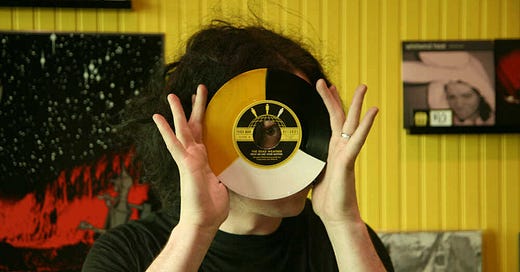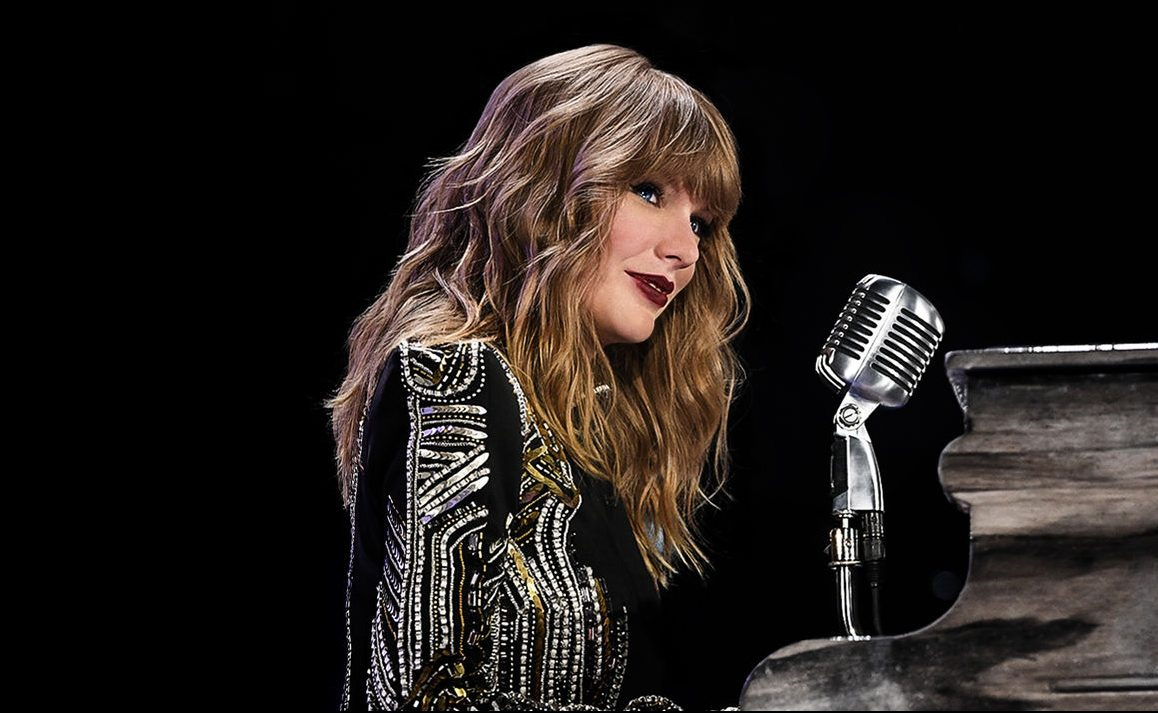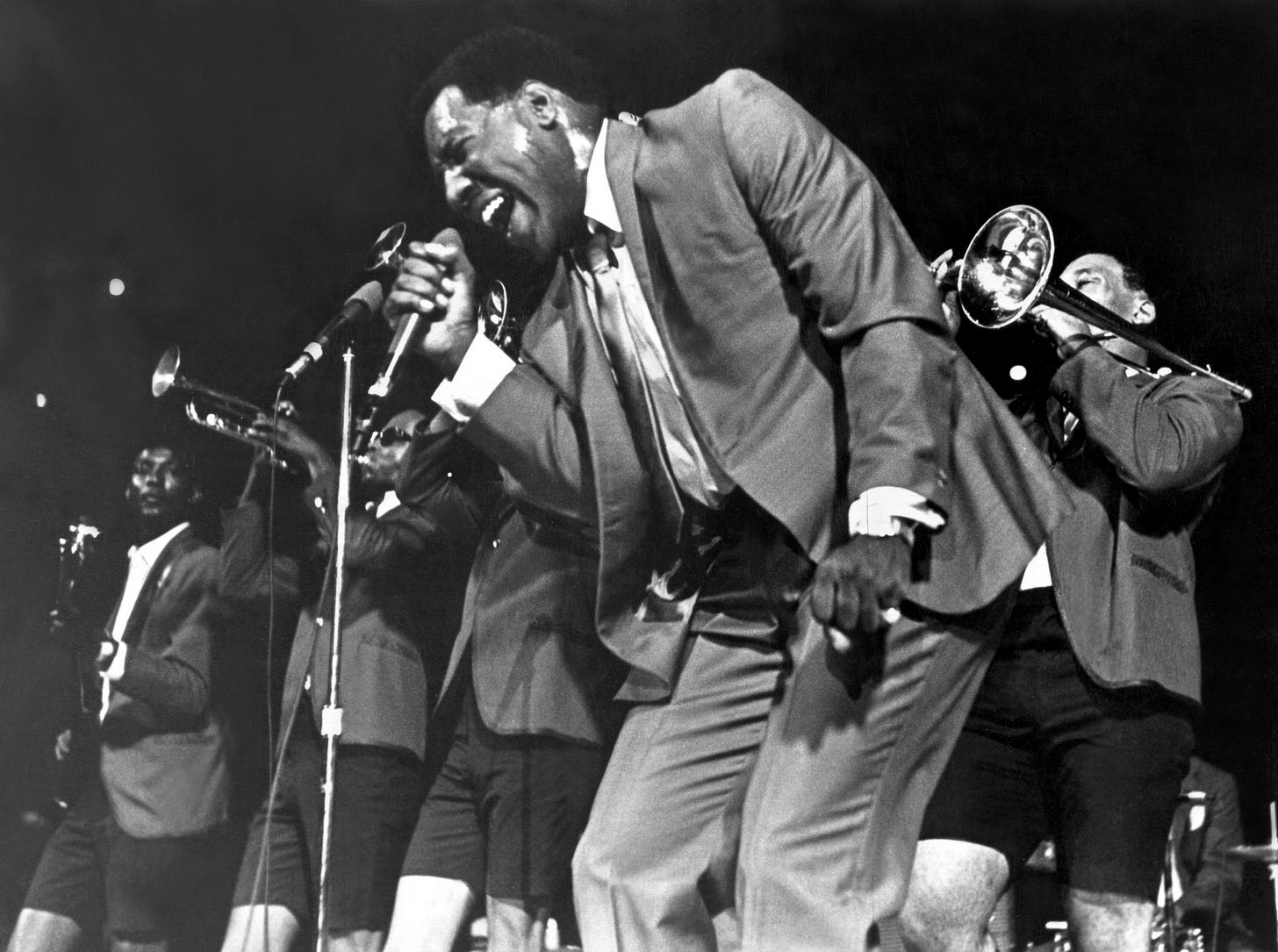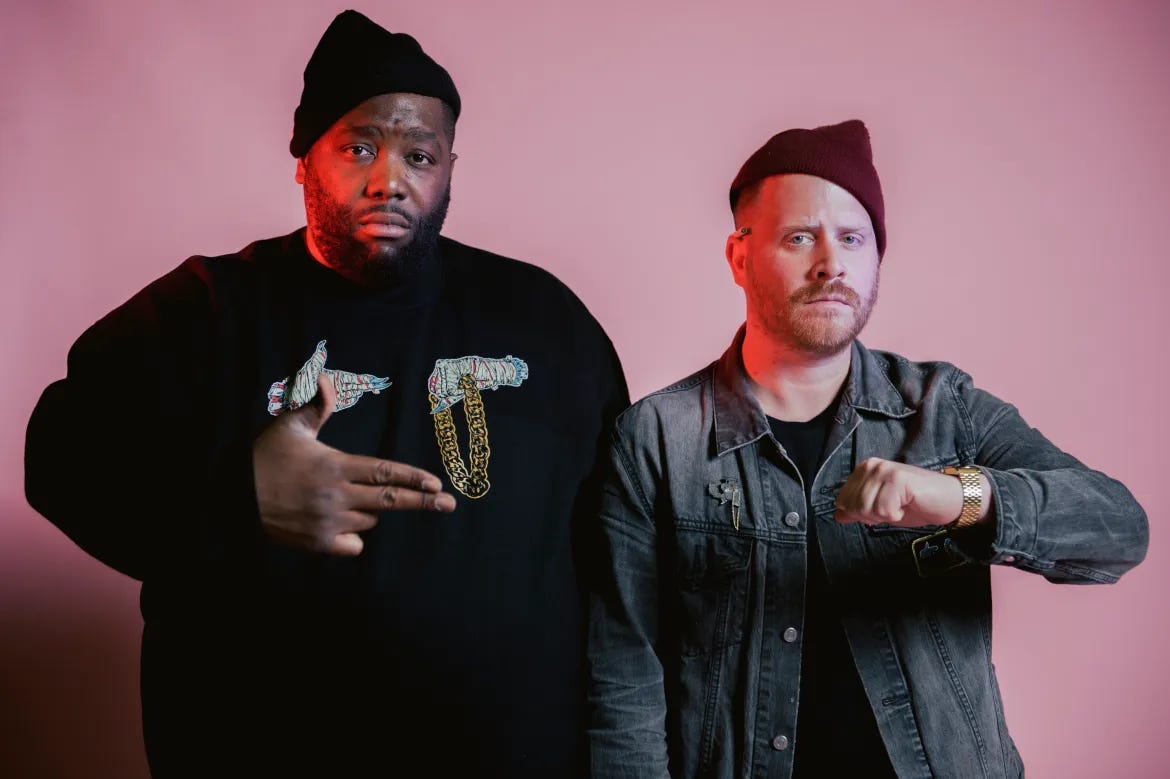Long-time readers may remember that, around the first week of May— roughly coinciding with my birthday— I like to take a quick break from reviewing new releases and instead highlight some all-time favorites. Consider this a free-flowing, loosely-defined, mostly-improvised approach toward creating a personal canon. Or, a long and rambling answer to the age-old desert island question.
1) Joe Henry - Tiny Voices (2003)
On what’s still his wildest and wooliest record, Henry writes melodies so straight and true, they could almost pass as forgotten pages from the Great American Songbook— and then he roughs them up with live-wire performances from a crack team of jazz musicians and studio pros, feeling their way through the material as if for the first time. It amounts to a disheveled yet strangely romantic version of Americana, casting a weary eye toward crumbling institutions and toward the human heart’s unrivaled penchant for self-delusion. God lurks behind the corner and occasionally takes center stage, his love as dangerous and untamed as the ruckus that serves as its soundtrack.
2) Bob Dylan - Love & Theft (2001)
There are Dylan albums where he sounds a little checked-out, but not this one— here he cackles and howls like he’s having the time of his life, investing equal vigor in the knock-knock jokes and the Civil War legends, the bawdy pick-up lines and the Old Testament prophecies. The songs — complicated, contradictory, strangely legible, assembled from old blues idioms and Groucho Marx routines— are like maps and legends for all the roads he’s traveled: The rural mystique of John Wesley Harding, the boisterous myth-making of The Basement Tapes, the careening energy of Highway 61 Revisited, and a few subtle reminders that his Born Again era was no joke at all.
3) Allen Toussaint - The Bright Mississippi (2009)
The legendary pianist leads a small band through a set of (mostly) instrumental songs, either written about or associated with the City of New Orleans. Played with contagious joie de vivre, the set amounts to a kind of oral history of the region and its people, Toussaint treating the songs not like museum pieces but rather like living folklore, ready to be retold in his own earthy yet elegant style.
4) The Innocence Mission - Birds of My Neighborhood (1999)
Inspired by a season of infertility and dashed dreams, husband-wife team Don and Karen Peris create a consoling, autumnal folk album that serves as a soundtrack to spiritual drought. In immaculate stanzas of devotional poetry, these quiet songs reflect on the struggle to maintain a joyful countenance and a faithful disposition, even when God’s good promises seem so far off.
5) Miranda Lambert - The Weight of These Wings (2016)
The high watermark for long-form country storytelling, The Weight of These Wings uses all of its double-album sprawl to explore the twisting back roads and unexpected detours of loss, regret, and self-reflection. Lambert uses the road as a controlling metaphor to explore her prodigal wanderings, her quest for a love stronger than her regrets. And she works with a first-rate backing band that splits the difference between country’s mainstream and its “Americana” tributary.
6) Miles Davis - Kind of Blue (1959)
Boring “desert island disc” #1: There’s nobody who doesn’t love Kind of Blue, the most unassuming of masterpieces, the most charming of sea changes. It remains the platonic ideal for small-group improvisation, every voice completely distinctive yet blending into a seamless, irreducible whole.
7) Erykah Badu - Mama’s Gun (2000)
Badu synthesizes the lessons learned from all her soul- and R&B-singing elders, drawing them together into a strikingly idiosyncratic album that never feels musty or overly referential. Through a perfectly-paced series of addicting grooves and warm live-band performances, she strikes a nimble balance between tough-talk and vulnerability. You get to the last song before realizing that it’s been a breakup album all along.
8) Peter Gabriel - So (1986)
Surely the strangest album to ever become a #1 blockbuster, So revels in contradictions— a devotion to cutting-edge studio technology but also to indigenous musical traditions; brazen carnality but also unashamed spirituality; quiet prayers but also strutting satires. I hear the album as a series of dreams, some startling lucid and others discernible only to the subconscious.
9) Bettye LaVette - The Scene of the Crime (2007)
A masterpiece of interpretive singing: Though nine out of 10 songs are covers, LaVette uses them to tell her story of being chewed up and spat out by the music industry, of years of disappointment and struggle, and of late-in-life triumph. As her backing band, the Drive-by Truckers are sympathetic, gritty, and smart enough to stay out of the way.
10) Over the Rhine - Good Dog Bad Dog (1996)
These intimate home recording were born out of a season of writer’s block— but clearly the dam finally burst: These are endlessly articulate songs about coping with failure, navigating the compromises associated with the creative life, and learning to receive grace. Good Dog Bad Dog is at once an intimate portrait of young, struggling artists, and a liturgy for anyone who’s ever felt like they don’t have anything left to give.
11) The Beatles - Revolver (1966)
Boring “desert island disc” #2. Revolver feels like The Beatles’ inflection point, bridging the kinetic live-band sound of their earlier recordings with the conceptual thinking and studio experimentation that came later. It created the template for crisp, colorful modern pop albums. And the subtext! Revolver is about the joy of innocence versus the darkness of adulthood, earnest whimsy versus arch cynicism, tradition versus transgression, and four men who are obviously drifting apart yet still sound like they can do anything together.
12) Duke Ellington - The Popular Duke Ellington (1967)
Following decades spent on the road as America’s most venerated bandleader, Duke finally took advantage of the long-player format, getting his band together to play their greatest hits with warmth and familiarity. It sounds incredible, and bears witness to a composer uncommonly gifted in conjuring melody, whimsy, and romance.
13) The Rolling Stones - Exile on Main St. (1972)
Boring “desert island disc” #3. When I think of The Rolling Stones, I think of menace, decadence, and unrepentant sleaze. All of that’s present here, except for maybe the unrepentant part: This might be the only Stones album to meaningfully reach through the darkness toward light, redemption, and— in at least one song— the actual face of Jesus. It's also their most believably lived-in excursion into country, gospel, soul, and blues.
14) Rosanne Cash - King’s Record Shop (1987)
Subsequent generations of country-singing women stand on the shoulders of Rosanne Cash, thanks to this record in particular— crisp and colorful, appreciative of tradition but unbeholden to it. You can credit producer Rodney Crowell with how great it sounds, but credit Cash for writing songs in which women have interiority, and are never content to be supporting characters in someone else’s life. And not for nothing, Cash’s top-shelf studio band ensures that this is one of the greatest guitar albums of the 1980s.
15) A Tribe Called Quest - The Low End Theory (1991)
In what I consider to be the platonic ideal for a rap record, two world-class conversationalists wax wittily and philosophically about the grind of the music business, the pitfalls of dating, the state of hip-hop, and of course their own dopeness. Their buddy-comedy synergy would reach its zenith on Midnight Marauders, but is already fully-formed here. Meanwhile, the rumbling, jazzy beats make it clear that Tribe is advancing a musical conversation that’s been going on for generations.
16) Taylor Swift - Reputation (2017)
On one of her most polarizing and attitudinal records, pop’s reigning monarch doesn’t just take a heel turn— she launches a full investigation into the many facets of her public persona. Using arch irony, parody, and camp, she gleefully leans into her image as an inveterate heart-chaser (and heartbreaker), yet she also finds time for serious inquiries into her own elusive desires. Reputation is also the only Swift album to meaningfully engage in the language of hip-hop, and hearing her adapt her signature aesthetics to a more acerbic and beat-driven style is especially fascinating in the context of her layers of self-inquiry.
See also: Taylor Swift’s The Tortured Poets Department.
17) Joni Mitchell - Court and Spark (1974)
Joni’s made sparse records, difficult records, experimental records, more accessible records— but she never made another record like Court and Spark, a lushly orchestrated pop album that exudes pleasure at every turn. Her writing is just as lovingly textured as the arrangements, offering warm, funny, melancholy reflections on the tension between personal autonomy and love’s call to selfless commitment.
18) D’Angelo - Black Messiah (2014)
At once long-gestated and rush-released, Black Messiah was a 14-year labor of love for its auteur, something that’s readily apparent from its gnarled funk and lived-in grooves. But then it was pushed out in sudden, a rapid response to a political environment increasingly fraught about extending dignity to Black bodies— resulting in a masterpiece that feels at once timeless and of-the-moment.
19) Aretha Franklin - Spirit in the Dark (1970)
You know Aretha the powerhouse singer, but Spirit in the Dark places equal focus on Aretha the pianist, leading a small band through a rollicking set of blues, ballads, and gospel rave-ups. Her songs mingle personal heartache with the language of the Church and of the Civil Rights movement— weaving personal and political concerns into a single cry for deliverance.
20) Elvis Costello and Burt Bacharach - Painted from Memory (1998)
A seamlessly-constructed study in heartbreak, buffeted by pitch-perfect melodies, sly humor, and unashamedly emotional arrangements. This is my go-to album when I want to be enveloped in rich, consoling sadness.
21) Lucinda Williams - Car Wheels on a Gravel Road (1998)
With an unparalleled command of rural vernaculars, Williams’ masterpiece charts a road trip through Southern small towns— and through her own history of loneliness and heartache. It’s a richly-detailed travelogue, emotionally unguarded and awash in local color.
22) Alvvays - Blue Rev (2022)
An exhaustive taxonomy— dream-pop, power-pop, jangle-pop, shoegaze, you name it— condensed into one perfectly-paced, explosively tuneful record. Pristine melodies are scuffed-up with dingy layers of noise and distortion, while the euphoric rush of the hooks is cut with the sadsack grandeur of the lyrics— a pungent blend of sweet and sour.
23) Beastie Boys - Paul’s Boutique (1989)
I can’t overstate how much my aesthetic worldview has been shaped by the fearless pan-culturalism of the Beastie Boys— how they treat all of pop culture as their playground, upholding Dylan records and Hanna-Barbera cartoons as equally sacred texts. Their collective persona here is one of endearing adolescence, just starting to bud into maturity: Sure, they think about boobs a lot, but they can still take a minute to remind us that racism is bad.
24) Otis Redding - Otis Blue: Otis Redding Sings Soul (1965)
An incomparable demonstration of soul music virtuosity— in just half an hour’s time, Redding blazes through feel-good ballads, down-and-dirty blues, and gospel-tinged laments. It’s all held together by tight, in-the-pocket performances from the Stax house band, setting a high watermark for studio musicianship.
25) Gillian Welch - Time (The Revelator) (2001)
Invoking patron saints John Henry and Elvis Presley, Welch and her partner Dave Rawlings write a set of ruminative songs about every artist’s desire to do good work that will last, even as they reckon with the obliterative tides of time. They rely on little more than deep harmonies and guitar pyrotechnics to enliven songs born of hillbilly music, standards, and old-time rock and roll.
26) Thelonious Monk - Thelonious Monk Trio (1954)
With due respect to all the great horn players he worked with, this feels like Monk in his purest distillation— bending his childlike whimsy to accommodate stride piano and barrelhouse blues, with extra firepower supplied by a couple of all-time great drummers.
27) Turnpike Troubadours - A Cat in the Rain (2023)
One of the great “male sadness” albums of our time. Forged in addiction and recovery, divorce and reconciliation, A Cat in the Rain evokes prodigal son imagery to create a moving testament to personal failure and unlikely second chances. Evan Felker’s songs are like finely-cut jewels, with nary a superfluous word— and they’re perfectly embodied by the band’s typically graceful, unhurried excursions into country-rock.
See also: My favorite albums of 2023.
28) Prince - Parade (1986)
The fullest flourishing of Prince’s weird genius— an endlessly inventive confection of rumbling, hard-edged funk with opulent, richly-textured psychedelia. The lyrics include cryptic religious imagery that’s as fascinating as it is opaque, plus some of his best-ever jokes.
29) The White Stripes - Get Behind Me Satan (2005)
Even on their weirdest, most guitar-less album, The White Stripes still sound like The White Stripes: Jack howls about birds and bees, lust and betrayal, and his pianos and marimbas thump almost as hard as Meg’s drums. It’s hard to think of another band so rooted in traditional blues, rock, and country idioms, yet still fully committed to their own inimitable style.
30) Kris Davis - Diatom Ribbons (2019)
A pianist and composer of mathematical precision, Davis creates songs that reveal patterns within patterns, conjuring geometric elegance from what seems at first like improvisation and sprawl. Her opus is Diatom Ribbons, where she teams with a revolving cast of jazz, rock, and hip-hop practitioners to create a beguiling program of avant garde funk and dreamy ballads.
31) Rhiannon Giddens with Francesco Turrisi - There is No Other (2019)
A celebration of acoustic instruments, folk traditions, and song as a connective tissue that bridges cultures and geographies. Giddens’ opera training is evident throughout, with each song conveying power and precision in equal measure. Her interests as a historic preservationist are made purposeful by her political intent, and rendered with a level of color and texture that’s remarkable coming from such an intimate ensemble.
32) Spoon - Ga Ga Ga Ga Ga (2007)
Spoon is the ultimate rock band for people who love grooves over riffs, and who adore drummers just as much as they do singers. This half-hour collection is a masterpiece of detailed studio-craft, a perpetual dopamine generator powered by sound and color, big beats and merciless hooks.
33) Run the Jewels - RTJ4 (2020)
Deployed like emergency rations at the peak of the George Floyd protests, RTJ4 is an album born of a winding history of dehumanization. It’s also a rap lover’s dream, an album targeted at the pleasure centers of old heads and connoisseurs. Bomb Squad-worthy production shapes street noise and psychedelic sound effects into the sleekest, funkiest, most undiluted Run the Jewels record, and provides the perfect cacophony to feed the duo’s wisecracks, conspiracy theories, and autobiography. For all its gestures toward nihilism, RTJ4 is deeply felt: If nothing else, Killer Mike and El-P derive considerable strength from their sense of brotherhood.
34) Sam Phillips - Martinis & Bikinis (1994)
For a brief moment in the 1980s, Phillips was one of Christian music’s most promising starlets; she pushed that aside, along with CCM’s pat moralism and right-wing drift, to make music that wrestles more honestly with faith and doubt. The T-Bone Burnett-produced Martinis & Bikinis is her punchiest work: Not just a work of incredible moral clarity, but one of the most colorful and convincing guitar-pop albums of the 90s.
35) Olivia Rodrigo - GUTS (2023)
The dream of the 1990s lives on, largely thanks to Olivia Rodrigo’s guitar-rock revival— a sharply-rendered combination of bratty pop-punk, sturdy ballads, and just a taste of Beastie Boys/Odelay-era rap. The songs are all about how it’s hard to be a teenage girl and harder still to be a famous one, and Rodrigo makes a meal of both themes, tearing into them with venomous humor, uproarious profanity, and a healthy dose of self-critique.










Thanks for the reminder that the Innocence Mission exists! I love that record too and haven’t listened to it in so long!